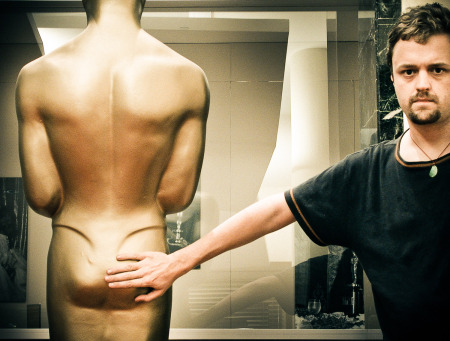Robbed at the Oscars
 Saturday, February 25, 2012 at 9:21PM
Saturday, February 25, 2012 at 9:21PM 
It’s Oscar time again, which means that one of my weird pet peeves is back in circulation. It comes in many variations, all centering around the idea that some film or person should win (or should have won) the coveted award.
A film that should have won didn’t, so that film was robbed. I can’t believe the Academy failed to recognize his performance.
Here’s the thing: The right films always win at the Oscars. Because the Oscars are a popularity contest. You should no more lament “incorrect” Oscar results than you should question who was awarded prom queen.
If you and your friends held a poll to choose your favorite beer, you wouldn’t ever think the results were “wrong”—they are what they are, just an amalgam of your tastes. Same thing if y’all got together voted on your favorite films of the year.
Now expand your circle of friends a bit and add some membership criteria, and you’ve got the Academy of Motion Picture Arts and Sciences.
“Popularity contest” sounds critical, but I don’t mean it that way. As far as I know, Academy members receive no instruction to choose the “correct” film for each award. They are simply invited to vote for their favorite. The Oscars are, essentially, an opportunity for the film industry to express their collective opinion about what they like.
Nominees are selected by individual branches of the Academy, but every member’s vote counts toward selecting a winner. Most of the Academy members are actors. So a handy rule of thumb when predicting Oscar winners is to ask yourself “Which film would a bunch of actors think had the best makeup? Or the best original music?”
Actors know movies well, and so they often make reasonable choices for Best Picture, Best Achievement in Screenwriting, and, of course, the performance categories. But when it comes to the more technical awards, their collective (and yes, this is a horrible generalization, which is why it is true) unfamiliarity means that often you can predict the results by replacing “best” with “most,” e.g. “Most Makeup,” “Most Visual Effects,” or “Most Sound Design.”
You’ll be even more accurate if you add “…in a film with good performances by actors who are well-liked by their peers.”
Often it seems that Oscars are awarded to the same kind of predictably Award-friendly films again and again. That the Academy’s choices aren’t that interesting. Another way of looking at a popular vote is that it represents an average opinion. And averages are never interesting.
Is there any hope for awarding Oscars to “the correct” winner instead of “the most popular?” Yes, but you won’t see much of it on TV. The Scientific and Technical branch of the Academy, chaired by Visual Effects legend Richard Edlund, has a specific charter to award the creators of technological developments that move the film industry forward. Voting committee members are required to validate and back up their opinions about who should win, and each award comes with a detailed write-up on why the technology and its creators deserve to be recognized. The subcommittees, broken out by field, research each potential award carefully, and often bestow them simultaneously to an early pioneer as well as a more recent champion of a particular technique. You can apply for consideration for a “Sci-Tech” award, as they are called. If your competitor applies, you’ll be invited to throw your hat in as well. Even if you fail to apply, the Academy might still inform you that you’re being considered. It’s possible that your competitor’s application could trigger an investigation that results in an award for you, and maybe not for them.
In other words, the Sci-Tech awards are the only Oscars that, by definition, and to the best of a well-intentioned group’s ability, go to the right person. It is an honorable and time consuming process, one to which I am proud to have contributed a few times.
Am I saying that the Sci-Tech awards are paragons of untarnished virtue and the regular Oscars are a sham? Not at all. The Sci-Tech award process isn’t infallible. And the Oscars are fun, meaningful, and respectable. Just don’t watch them with any sense that there’s a right or wrong way for them to pan out. It’s not an evening of what’s right. It’s an evening of what’s most liked.









Reader Comments (3)
It looks like you're rubbing the genie in just the right spot. Hope you get what you wish for.
(I've been reading this great blog for years, but just had to make my 1st comment when I saw that photo.)
You're more generous that I am about the Oscars. True, it is a popularity contest but unlike a simple poll or friends raising hands, there is quite a bit of money, hired professionals and various assorted shenanigans used to sway the voters - as the winner can turn the award into money, both for the current film and for future prospects.
And the fact the membership is mostly older white males (http://www.tnr.com/article/film/100996/84-academy-awards-oscars-voters) and the likelihood that people vote about films they have not seen.
"an opportunity for the film industry to express their collective opinion about what they like."
Yeah but I think it's more complicated then that. Why all the campaigning, the politics? The votes that members make can't just be about what film they like most. There has to be some inside influencing going on. I mean, a lot of money is at stake.
Get the Oscar, get more DVD sales, etc.